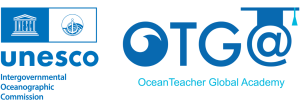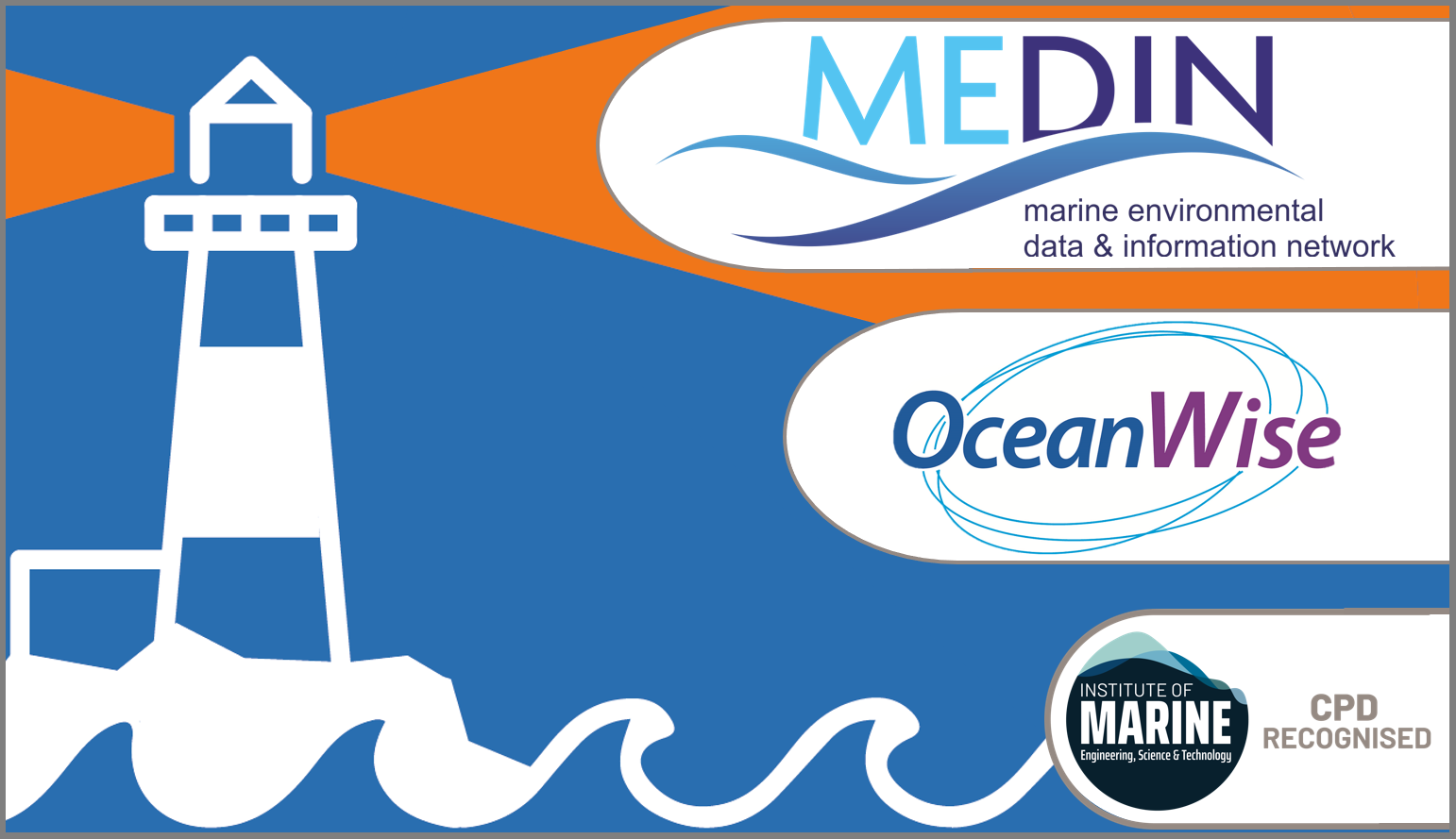Search results: 48
MEDIN_Jun2024
Marine Data Management, Governance and the MEDIN toolset (Jun 2024)
This free online training course is suitable for anyone responsible for collecting or managing marine environmental data in the public sector, industry or for education or research. Familiarity with different marine data types, and how data is acquired and used, would be helpful but not essential. Prior knowledge or practical experience of data management is not required. The course can be taken as a whole, or attendees can select modules according to two streams: Governance; Practical MEDIN.
MEDIN_Mar2024
Marine Data Management, Governance and the MEDIN toolset (Mar 2024)
This free online training course is suitable for anyone responsible for collecting or managing marine environmental data in the public sector, industry or for education or research. Familiarity with different marine data types, and how data is acquired and used, would be helpful but not essential. Prior knowledge or practical experience of data management is not required. The course can be taken as a whole, or attendees can select modules according to two streams: Governance; Practical MEDIN.
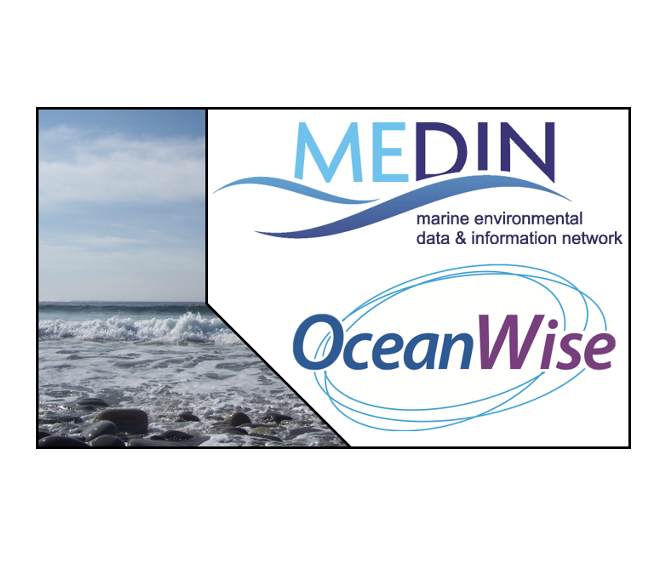
MEDIN_May2023
Marine Data Management, Governance and the MEDIN toolset (May 2023)
This free online training course is suitable for anyone responsible for collecting or managing marine environmental data in the public sector, industry or for education or research. Familiarity with different marine data types, and how data is acquired and used, would be helpful but not essential. Prior knowledge or practical experience of data management is not required. The course can be taken as a whole, or attendees can select modules according to two streams: Governance; Practical MEDIN.
MEDIN_May2025
Marine Data Management, Governance and the MEDIN toolset (May 2025)
The Marine Environmental Data and Information Network (MEDIN) is a partnership of UK organisations committed to improving access to marine data. MEDIN is open to all with an interest in marine data and information. MEDIN is funded by a consortium of 16 sponsors and has over 60 partners that represent government departments and agencies, research organisations and private companies committed to practise good data management. MEDIN reports to the UK Marine Science Coordination Committee.
This ONLINE course demonstrates how data management ‘best practice’ can improve organisational efficiency in data acquisition, analysis, curation and sharing. It covers data use with respect to corporate risk, re-use, audit and traceability, whilst at the same time helping minimising costs.
The course will equip attendees to better meet the challenge of keeping on top of the ever-increasing volumes and types of data that is being created and how to manage this data and make it available to users as meaningful information, whether using proprietary or open-source software and systems as enablers.
Aims & Objectives
The course aims to give participants a broad understanding of data governance, management principles, and system components and how data can be published information and re-used with a focus on the tools that the Marine Environmental Data and Information Network (MEDIN) provides as examples of best practice.
Expected Learning Outcomes
- An understanding of MEDIN and why data management is important and how it can reduce costs, risk, and add value through extending its original purpose.
- An understanding of the fundamentals of how data is collected, managed, published and used plus how important metadata is!
- An appreciation of data management components based on the International Data Management Association Book of Knowledge (DM-BOK)
- Knowledge of the importance of metadata and practical guidance in its creation, maintenance and dissemination
- Have an appreciation of the need to use words, phrases and terms to describe or explain marine data content and to understand how controlled vocabularies are used within the MEDIN standard and guidelines
- Appreciate how geospatial data can be accurately represented
- Understand the role and value of adopting data governance and how this relates to business management and corporate governance.
- Understand what discovery metadata is, what the MEDIN discovery metadata standard is and how it is used on the MEDIN portal.
- Be able to use the online metadata editor and metadata maestro to create MEDIN compliant discovery metadata records.
- Understand the ways in which data is now published and considerations associated with sharing and re-use
- Appreciate that the MEDIN data guidelines are a tool to create consistent datasets with comprehensive metadata, that allows data to be shared, understood and reused by others with ease.
Course content
The course comprises a series of presentations, demonstrations and check-point reviews, with a large practical element to help users become familiar with:
- Why data management is important and how it can and arguably should be part of an organisations business management framework alongside quality, occupational health and safety, and information security, all of which are covered by ISO accreditation.
- The role of a data policy and management plan, and things to consider and how data can be shared, published and re-used.
- Data management principles, standards and components, including data lifecycle and quality, the role of vocabularies (or data dictionaries) and the importance of creating, maintaining and publishing metadata.
- The resources and other benefits of MEDIN and practical instruction in the use of the MEDIN data guidelines, metadata standard and controlled vocabularies.
Course modules include:
- Module 1. Course content and objectives
- Module 2. Introduction to MEDIN as an exemplar data partnership and management framework
- Module 3. Data management overview, principles and organisation
- Module 4. Data in a Business Management Framework (Policy, Planning, Review)
- Module 5. Standards Overview
- Module 6. Data management components frameworks and infrastructure
- Module 7. Practical session
- Module 8. MEDIN Data Guidelines
- Module 9. Data Sharing and Publishing
- Module 10. Course Summary
Target audience and prerequisites
This training course is suitable for anyone responsible for collecting or managing marine environmental data in the public sector, industry, or for education or research, for example:
- Existing and potential data managers who wish to gain an overview of data governance, policy and principles and/or want to learn more about using the MEDIN metadata standard data guidelines in their day to day work.
- Contractors who want to implement good data management practice and/or have been asked to supply MEDIN compliant metadata.
- Bachelors/masters/PhD students or recent graduates interested in data management best practice and adding to their professional skill set.
Pre-requisites: An understanding of marine data collection is beneficial, however no prior knowledge of MEDIN or data management is required. Familiarity with different marine data types, and how data is acquired and used, would be helpful but not essential. Prior knowledge or practical experience in data management is not required.
Language of Instruction: English
Instructors
- Roseanna Wright (MEDIN/NOC)
- Colm Walsh (MEDIN/NOC)
- Alice Rysiecki (MEDIN/NOC)
- Chloe Figueroa-Ashforth (DASSH/MBA)
- Mike Osborne (OceanWise)
Course Format and Duration
The course takes place over 5 days with online lectures delivered in live sessions (2-3 hours, with regular breaks) in the mornings (UK time) and independent-study and practical assignments in the afternoons.
Monday-Friday: approx. 09:00-12:00 GMT/BST + drop-in sessions 14:00-14:30 GMT/BST
Attendance not mandatory, sessions are recorded.
Application Process
Please self-enroll on the course on OceanTeacher:https://classroom.oceanteacher.org/course/view.php?id=1148
The course enrolment key can be requested from the course organiser (MEDIN). Number of places is limited to 60 participants.
Contacts:
MEDIN: Roseanna Wright (roswri@bodc.ac.uk) (Course Organiser)
OTGA Secretariat: ioc.training@unesco.org
In case of need for further clarifications please use the contacts above, always using as email subject:
(Online) Marine Data Management, Governance and the MEDIN toolset, 19-23 May 2025
Costs
No tuition fee.
This course is organised by MEDIN and hosted by OTGA.
More information about MEDIN's workshops can be found on https://www.medin.org.uk/medin-workshops
Assessment and Certificates
A combination of quizzes and assignments to ensure understanding and practical application of knowledge and skills acquired during the course.
Certificates will be issues based on the required activities (chapters, quizzes and assignments) for each pathway (Governance, Practical MEDIN, or Combined) being completed.
The course has been awarded official recognition as contributing to the Continuing Professional Development (CPD) requirements of the Institute of Marine Engineering, Science and Technology’s (IMarEST’s) members.
Feedback survey:
At the end of the course, you will be asked to fill out a feedback survey. This information will be used to improve future courses.
Cancellation policy:
In the event of cancellation of the course by the OTGA or its affiliates, we will provide notification of cancellation at least 7 days prior to the course date. In the event of cancellation by the attendee, we should receive notification of cancellation at least 7 days prior to the course date.
MEDIN_Nov2022
Marine Data Management, Governance and the MEDIN toolset (Nov 2022)
This free training course is suitable for anyone responsible for collecting or managing marine environmental data in the public sector, industry or for education or research. Familiarity with different marine data types, and how data is acquired and used, would be helpful but not essential. Prior knowledge or practical experience of data management is not required. The course can be taken as a whole, or attendees can select modules according to two streams: Governance; Practical MEDIN.

MEDIN_Nov2023
Marine Data Management, Governance and the MEDIN toolset (Nov 2023)
This free online training course is suitable for anyone responsible for collecting or managing marine environmental data in the public sector, industry or for education or research. Familiarity with different marine data types, and how data is acquired and used, would be helpful but not essential. Prior knowledge or practical experience of data management is not required. The course can be taken as a whole, or attendees can select modules according to two streams: Governance; Practical MEDIN.
MEDIN_Oct2025
Marine Data Management, Governance and the MEDIN toolset (October 2025)
The Marine Environmental Data and Information Network (MEDIN) is a partnership of UK organisations committed to improving access to marine data. MEDIN is open to all with an interest in marine data and information. MEDIN is funded by a consortium of 16 sponsors and has over 60 partners that represent government departments and agencies, research organisations and private companies committed to practise good data management. MEDIN reports to the UK Marine Science Coordination Committee.
This ONLINE course demonstrates how data management ‘best practice’ can improve organisational efficiency in data acquisition, analysis, curation and sharing. It covers data use with respect to corporate risk, re-use, audit and traceability, whilst at the same time helping minimising costs.
The course will equip attendees to better meet the challenge of keeping on top of the ever-increasing volumes and types of data that is being created and how to manage this data and make it available to users as meaningful information, whether using proprietary or open-source software and systems as enablers.
Aims & Objectives
The course aims to give participants a broad understanding of data governance, management principles, and system components and how data can be published information and re-used with a focus on the tools that the Marine Environmental Data and Information Network (MEDIN) provides as examples of best practice.
Expected Learning Outcomes
- An understanding of MEDIN and why data management is important and how it can reduce costs, risk, and add value through extending its original purpose.
- An understanding of the fundamentals of how data is collected, managed, published and used plus how important metadata is!
- An appreciation of data management components based on the International Data Management Association Book of Knowledge (DM-BOK)
- Knowledge of the importance of metadata and practical guidance in its creation, maintenance and dissemination
- Have an appreciation of the need to use words, phrases and terms to describe or explain marine data content and to understand how controlled vocabularies are used within the MEDIN standard and guidelines
- Appreciate how geospatial data can be accurately represented
- Understand the role and value of adopting data governance and how this relates to business management and corporate governance.
- Understand what discovery metadata is, what the MEDIN discovery metadata standard is and how it is used on the MEDIN portal.
- Be able to use the online metadata editor and metadata maestro to create MEDIN compliant discovery metadata records.
- Understand the ways in which data is now published and considerations associated with sharing and re-use
- Appreciate that the MEDIN data guidelines are a tool to create consistent datasets with comprehensive metadata, that allows data to be shared, understood and reused by others with ease.
Course content
The course comprises a series of presentations, demonstrations and check-point reviews, with a large practical element to help users become familiar with:
- Why data management is important and how it can and arguably should be part of an organisations business management framework alongside quality, occupational health and safety, and information security, all of which are covered by ISO accreditation.
- The role of a data policy and management plan, and things to consider and how data can be shared, published and re-used.
- Data management principles, standards and components, including data lifecycle and quality, the role of vocabularies (or data dictionaries) and the importance of creating, maintaining and publishing metadata.
- The resources and other benefits of MEDIN and practical instruction in the use of the MEDIN data guidelines, metadata standard and controlled vocabularies.
Course modules include:
- Module 1. Course content and objectives
- Module 2. Introduction to MEDIN as an exemplar data partnership and management framework
- Module 3. Data management overview, principles and organisation
- Module 4. Data in a Business Management Framework (Policy, Planning, Review)
- Module 5. Standards Overview
- Module 6. Data management components frameworks and infrastructure
- Module 7. Practical session
- Module 8. MEDIN Data Guidelines
- Module 9. Data Sharing and Publishing
- Module 10. Course Summary
Target audience and prerequisites
This training course is suitable for anyone responsible for collecting or managing marine environmental data in the public sector, industry, or for education or research, for example:
- Existing and potential data managers who wish to gain an overview of data governance, policy and principles and/or want to learn more about using the MEDIN metadata standard data guidelines in their day to day work.
- Contractors who want to implement good data management practice and/or have been asked to supply MEDIN compliant metadata.
- Bachelors/masters/PhD students or recent graduates interested in data management best practice and adding to their professional skill set.
Pre-requisites: An understanding of marine data collection is beneficial, however no prior knowledge of MEDIN or data management is required. Familiarity with different marine data types, and how data is acquired and used, would be helpful but not essential. Prior knowledge or practical experience in data management is not required.
Language of Instruction: English
Instructors
- Roseanna Wright (MEDIN/NOC)
- Colm Walsh (MEDIN/NOC)
- Alice Rysiecki (MEDIN/NOC)
- Julie Bunt (DASSH/MBA)
- Mike Osborne (OceanWise)
Course Format and Duration
The course takes place over 5 days with online lectures delivered in live sessions (2-3 hours, with regular breaks) in the mornings (UK time) and independent-study and practical assignments in the afternoons.
Monday-Friday: approx. 09:00-12:00 GMT/BST + drop-in sessions 14:00-14:30 GMT/BST
Attendance not mandatory, sessions are recorded.
Application Process
Please self-enroll on the course on OceanTeacher:https://classroom.oceanteacher.org/course/view.php?id=1164
The course enrolment key can be requested from the course organiser (MEDIN). Number of places is limited to 60 participants.
Contacts:
MEDIN: Roseanna Wright (roswri@noc.ac.uk) (Course Organiser)
OTGA Secretariat: ioc.training@unesco.org
In case of need for further clarifications please use the contacts above, always using as email subject:
(Online) Marine Data Management, Governance and the MEDIN toolset, 13-17 October 2025
Costs
No tuition fee.
This course is organised by MEDIN and hosted by OTGA.
More information about MEDIN's workshops can be found on https://www.medin.org.uk/medin-workshops
Assessment and Certificates
A combination of quizzes and assignments to ensure understanding and practical application of knowledge and skills acquired during the course.
Certificates will be issues based on the required activities (chapters, quizzes and assignments) for each pathway (Governance, Practical MEDIN, or Combined) being completed.
The course has been awarded official recognition as contributing to the Continuing Professional Development (CPD) requirements of the Institute of Marine Engineering, Science and Technology’s (IMarEST’s) members.
Feedback survey:
At the end of the course, you will be asked to fill out a feedback survey. This information will be used to improve future courses.
Cancellation policy:
In the event of cancellation of the course by the OTGA or its affiliates, we will provide notification of cancellation at least 7 days prior to the course date. In the event of cancellation by the attendee, we should receive notification of cancellation at least 7 days prior to the course date.
MEDIN_SEP2021
Marine Data Management, Governance and the MEDIN toolset (Sep 2021)
NOTE: This is edition September 2021

MEDIN_Sep2023
Marine Data Management, Governance and the MEDIN toolset (Sep 2023)
This free online training course is suitable for anyone responsible for collecting or managing marine environmental data in the public sector, industry or for education or research. Familiarity with different marine data types, and how data is acquired and used, would be helpful but not essential. Prior knowledge or practical experience of data management is not required. The course can be taken as a whole, or attendees can select modules according to two streams: Governance; Practical MEDIN.
MEDIN_Sep2024
Marine Data Management, Governance and the MEDIN toolset (Sep 2024)
This free online training course is suitable for anyone responsible for collecting or managing marine environmental data in the public sector, industry or for education or research. Familiarity with different marine data types, and how data is acquired and used, would be helpful but not essential. Prior knowledge or practical experience of data management is not required. The course can be taken as a whole, or attendees can select modules according to two streams: Governance; Practical MEDIN.

MIT2023
Marine Information Technologies
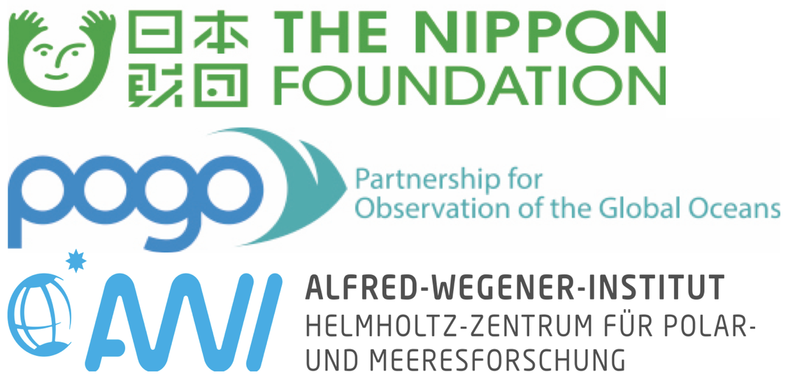
NFPOGO-ODM2023
NF-POGO Centre of Excellence. Ocean Data Management 2023
This 2 week-long module on Ocean Data Management is part of the Nippon Foundation-POGO Centre of Excellence (NF-POGO CofE) and hosted by AWI (cohort 2023). This module is part of an intensive training course for young professionals at the post-graduate level, ten months in duration, with an intake of ten trainees per year. The course is sponsored by the Nippon Foundation and hosted by the Alfred Wegener Institute for Polar and Marine Research.
This module provides a comprehensive introduction to a wide variety of earth science datasets, formats and analysis software. Students will learn and practice methods using a common ocean area, and they are expected to create a personal project of data products for a marine region of their own choosing. Personal projects are presented by the students at the end of the course.
Course/Module Dates: 5-16 June 2023

NFPOGO-ODM2022
NF-POGO Centre of Excellence. Ocean Data Management module
This 2 week-long module on Ocean Data Management is part of the Nippon Foundation-POGO Centre of Excellence (NF-POGO CofE) and hosted by AWI (cohort 2022). This module is part of an intensive training course for young professionals at the post-graduate level, ten months in duration, with an intake of ten trainees per year. The course is sponsored by the Nippon Foundation and hosted by the Alfred Wegener Institute for Polar and Marine Research.
This module provides a comprehensive introduction to a wide variety of earth science datasets, formats and analysis software. Students will learn and practice methods using a common ocean area, and they are expected to create a personal project of data products for a marine region of their own choosing. Personal projects are presented by the students at the end of the course.
Course/Module Dates: 28 March-8 April 2022

NFPOGO-ODM2021_Unit5
NF-POGO Centre of Excellence. Ocean Data Management module
This 2 week-long module on Ocean Data Management is part of the Nippon Foundation-POGO Centre of Excellence (NF-POGO CofE) and hosted by AWI (cohort 2021). This module is part of an intensive training course for young professionals at the post-graduate level, ten months in duration, with an intake of ten trainees per year. The course is sponsored by the Nippon Foundation and hosted by the Alfred Wegener Institute for Polar and Marine Research.
This module provides a comprehensive introduction to a wide variety of earth science datasets, formats and analysis software. Students will learn and practice methods using a common ocean area, and they are expected to create a personal project of data products for a marine region of their own choosing. Personal projects are presented by the students at the end of the course.
Course/Module Dates: 15-26 February 2021
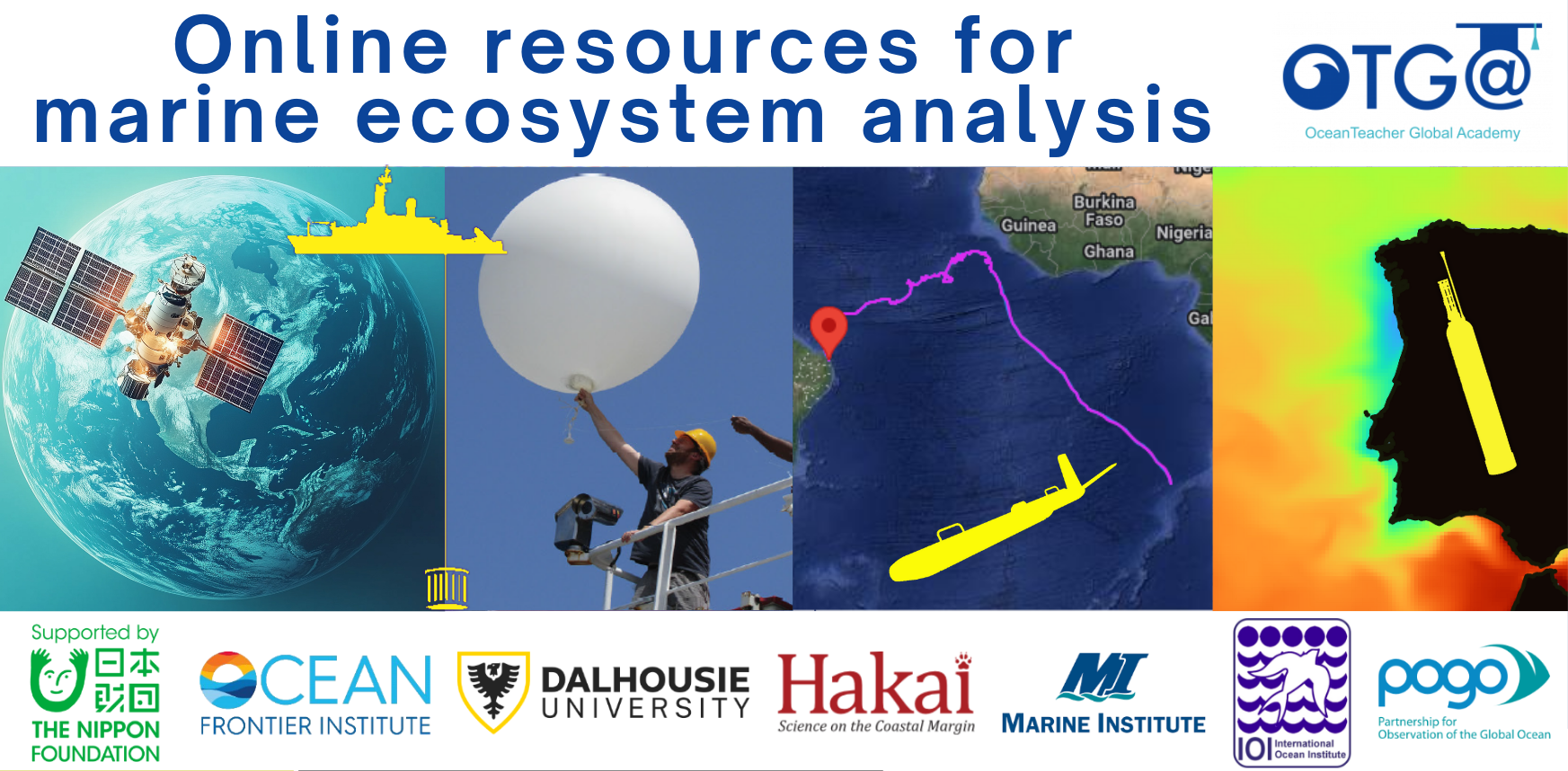
ROAEM25-Canada
NF-POGO Centre of Excellence. Online resources for marine ecosystem analysis 2025
This introductory training is designed for participants beginning to work with online ocean data. The course provides practical guidance on accessing freely available in situ and remote oceanographic datasets, and on using open-source software tools to generate basic ocean data products. Participants will gain experience in obtaining key oceanographic variables—including data from the World Ocean Database, sea surface temperature, chlorophyll-a concentration, wind, and surface currents—and in visualizing and processing them to support initial analysis and assessment of meso- to large-scale marine and coastal ecosystems.
Venue
Marine Institute of Memorial University. St Johns, Newfoundland, Canada
Learning outcomes
As a result of this course, CofE scholars will acquire basic knowledge to:
- Obtaining relevant oceanographic variables such as ocean surface temperature, chlorophyll-a concentration, surface currents,
- Visualising and developing products to support initial, analysis and assessment of meso to large-scale marine and coastal ecosystems.
Target audience
The training is open to the 10 CofE scholars. More information on the training programme at https://www.ofi.ca/programs/centre/program
Pre-requisites:
Participants must:
-
Have prior knowledge of oceanography;
-
Bring their own laptop;
-
A working knowledge of English.
Course content
Module 1: Introduction to Ocean Observation
- Importance of observational oceanography and the Global Ocean Observing System
- Platforms for collecting and visualising oceanographic data
Module 2: Defining Area of Interest & Folder structure
- Selection and delimitation of area of interest.
- Organisation of folder structure and file names
Module 3: Ocean Data View & World Ocean Data database
- The World Ocean Database (WOD), select and download WOD data
- The Ocean Data View (ODV), download and install ODV
- Create data collection on ODV
- Import and analyse WOD data on ODV
- Quality control on ODV
- Prepare and export products on ODV
- Geographic Coordination System and Basic GIS file formats
- QGIS, download and install, basic layout
Module 5: Creating a GIS project with basic marine and auxiliary data
- Sources of basic, auxiliary data sources for marine GIS
- Import shape and raster format data into the GIS
- Shape and raster layers clipping
- Prepare map figure
- Obtain Essential Ocean Variables from diverse portals
- GIS tools such as interpolation, clipping with masks, extract isolines from raster, raster calculator, derive vectors from scalar components
Module 7: Online visualisation of oceanographic products
- Acquaint with oceanographic data portals and their basic tools for plotting and consulting oceanographic parameters of interest
- Export products (figures, plots, data, GIS format files)
Language of instruction: English
Duration, Synchronous Sessions, and Format
The training will take place face-to-face between 24 to 28 November, 2025, with a duration of approximately 35 hours.
Live sessions are planned from Monday to Friday, from 9:00-12:30 and 13:30-17:00.
The course has an online learning component to complement the learning activities and assessments. Live online sessions may be broadcasted if one or more scholars are not able to be present on-site.
Instructors
Organizers
Participation
This course is offered by NF-POGO Centre of Excellence in Observational Oceanography programme to its scholars.
POGO and UNESCO are committed to promoting equal access principles. Participation from minority or underrepresented groups are strongly encouraged.
Assessment & Certificate
Participants will carry out guided exercises in the classroom and OTGA e-Learning platform, focusing first on a shared Area of Interest (AOI). They will then apply the same methods individually to a second AOI of their choice. On the final day, each participant will present their results to the group, demonstrating the skills acquired throughout the training. The 12 assignments and the final presentation will be graded, and sucessfull completion will require achieving 70% passmark.
Contacts
- Course Coordinator: Lilian A. Krug lakrug@ualg.pt
- OTGA Secretariat: ioc.training@unesco.org
Costs
Free of charge. There are no tuition fees.
Cancellation policy
In the event of cancellation of the course by the OTGA or its affiliates, we will provide notification of cancellation at least 7 days prior to the course date. In the event of cancellation by the attendee, we should receive notification of cancellation at least 7 days prior to the course date.

BlueCarbon_China2024
Observation technique about blue carbon
This training course will focus on raising the knowledge on the monitoring, assessment, and accounting of marine blue carbon. And also the related instrumentation and calibration of some biogeochemical parameters are the main content of the training course. The course will use case studies relevant for the Western Pacific.
Learning outcomes
By the end of the course, the participants should:
- Have a comprehensive understanding of the monitoring and assessment of coastal blue carbon.
- Be able to explain the role of connotation, Classification, and Accounting of Marine Carbon Sequestration.
- Be familiar with the instrumentation and calibration of some biogeochemical parameters.
Target audience and prerequisites
Include, but are not limited to, the following researchers and management staff on marine ecological observation, who deal with biogeochemical parameter measurements and instrumentation.
Language of instruction: English
Course content
Day 1 The monitoring and assessment of coastal blue carbon
Day 2 Connotation, Classification, and Accounting of Marine Carbon Sequestration
Day 3-5 Instrumentation and calibration of some biogeochemical parameters (dissolved oxygen and pH in seawater for example)
- utilization and maintenance of dissolved oxygen and pH instruments/sensors
- calibration of dissolved oxygen and pH sensors for seawater use in a lab
- calibration method of multi-parameter compensation for optical dissolved oxygen sensor in seawater
Instructors
Learner assessment and certificate
Assessment will be done through (online) quizzes.
Successful completion of the assignments (passmark: 80%) and active attendance of all of the synchronous sessions will be needed to be awarded a certificate of completion
Technology requirements
To complete this course, you should have access to:
- Latest version of either Chrome, Edge, or Firefox, web browsers
- Access to internet
- Firewalls must be disabled in order to be able to attend the synchronous live sessions
Course Duration, Synchronous Sessions, and Format
The course will take place online between November 25 to 29, 2024, with a duration of approximately 20 hours.
This is a 20-hour training course that will run online between 25-29 Nov 2024, including 3 (daily) synchronous sessions to be held between 13-16 pm (UTC+8) using BigBlueButton web conferencing platform.
The course includes 15 hours of synchronous work (content and discussion) plus 5 hours of individual asynchronous work for completion of assessments.
Application process and selection criteria
A limited number of seats (45) are available. Please complete the online application form available on this LINK. The applications start 01 October 2024. The deadline to submit the application is 31 October 2024 (23:59 CET: Central European Time).
UNESCO is committed to promoting equal access principles. Applications from minority or underrepresented groups are strongly encouraged.
The Selecting Committee will be set up by the hosts (NCOSM and NMDIS), which will comprise the course coordinator, organizers, and lecturers. Selection criteria include the applicant’s academic background, professional experience/duties (such as marine observation, blue carbon and ecosystem data management), and how the applicant will be able to apply the new knowledge acquired. Priority will be given to participants from the West Pacific
Contacts
- Course Coordinators: YU Jianqing yujianqing@ncosm.org.cn; Xu Dian ncosmws@ncosm.org.cn
- OTGA Secretariat: ioc.training@unesco.org
Costs
Free of charge. There are no tuition fees.
The instructors will give the course voluntarily with support from NCOSM.
Cancellation policy
In the event of cancellation of the course by the OTGA or its affiliates, we will provide notification of cancellation at least 7 days prior to the course date. In the event of cancellation by the attendee, we should receive notification of cancellation at least 7 days prior to the course date.
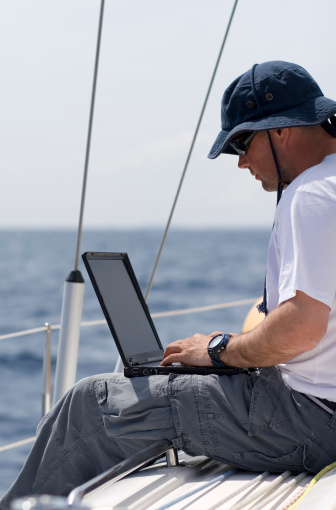
ODM2022
Ocean Data Management 2022

SP_ODM2023
Ocean Data Management 2023
This online, fully self-paced training course provides a comprehensive introduction to the management of marine data, including the guiding principles of data management and typical responsibilities for data managers, data stewards and scientists.
This course is developed by, and for, marine data managers, data stewards and researchers, working in institutions responsible for the collection and good management of marine data.
During this training course, you will be introduced to several general aspects related to the management of marine data, including, metadata, quality control, data policy, data sharing and publishing, data management plans and the research data life cycle. By the end of this course, you will be able to describe and implement the core tasks required for the processing of marine data, explain the importance of metadata, advise researchers on the research data life cycle and explain why a good data management plan is key from the very first initiation steps of a project.

SP_ODM2024
Ocean Data Management 2024
This online, fully self-paced training course provides a comprehensive introduction to the management of marine data, including the guiding principles of data management and typical responsibilities for data managers, data stewards and scientists.
This course is developed by, and for, marine data managers, data stewards and researchers, working in institutions responsible for the collection and good management of marine data.
During this training course, you will be introduced to several general aspects related to the management of marine data, including, metadata, quality control, data policy, data sharing and publishing, data management plans and the research data life cycle. By the end of this course, you will be able to describe and implement the core tasks required for the processing of marine data, explain the importance of metadata, advise researchers on the research data life cycle and explain why a good data management plan is key from the very first initiation steps of a project.
Learning outcomes
By the end of this training, participants should be able to:
- Describe the phases of the Research Data Life Cycle
- Explain the concept of a Data Management Plan
- Explain the concept and importance of metadata
- identify suitable file formats for data preservation and sharing
- Identify appropriate repositories for your data
- Summarise the goal of assigning a data licence
- Explain the common concerns related to data reuse
Target audience
Marine data managers, data stewards and researchers, working in institutions responsible for the collection and good management of marine data.
This is a self-taught course that includes quizzes designed to help learners assess their own learning at regular intervals.Learner Assessment
This is a self-taught course that includes quizzes designed to help learners assess their own learning at regular intervals. In order to successfully complete the course and award a Certificate at the end, the following is mandatory:
- complete all lessons in each Module of the course;
- complete all quizzes (70% minimum score for each quiz);
Note: submitting the course feedback survey is mandatory to obtain the course certificate.
Technology requirements
To complete this course, participants should have access to:
- Computer with Windows or Mac operating system
- Latest version of either Chrome, Edge, Firefox, or Safari web browsers
How to enroll
Please register on the OceanExpert website (www.oceanexpert.org). Once your OceanExpert account is approved (this is not done immediately), you can self-enrol in the course. If you already have an OceanExpert account, you can self-enrol in the course using your OceanExpert username and password. Enrolment is available until 1 December 2024.
First log-in OceanTeacher, then access the course page and click on self-enrollment.
The enrolment key is Odm2024-2
For any questions please contact the OTGA Secretariat (ioc.training@unesco.org) always using the name of the course as email subject.
There are no tuition fees.
UNESCO is committed to promote equal access principles. Applications from minority or underrepresented groups are strongly encouraged.
Feedback survey
At the end of the course, you will be asked to fill out a feedback survey. This information will be used to improve future courses.
